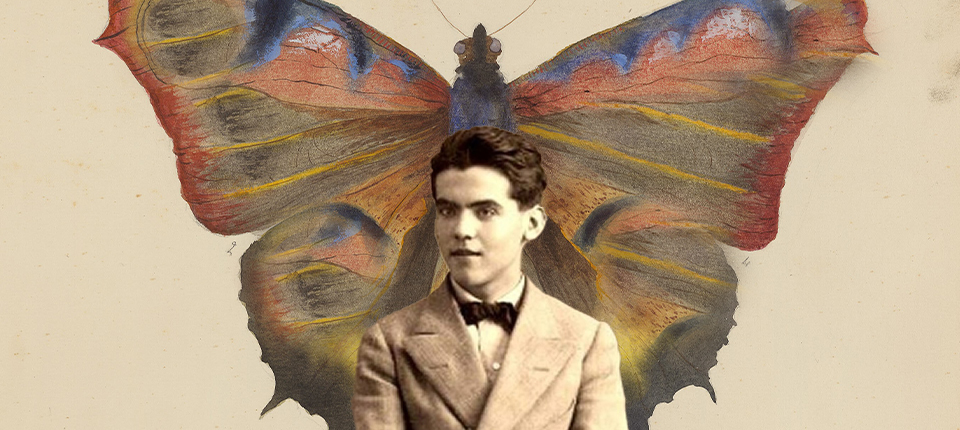March 17 – 21, 2025 ‹ Literary Hub
The Better of the Literary Web, Each Day

TODAY: In 1920, Federico García Lorca’s first play, The Butterfly’s Evil Spell, is poorly obtained at its premiere in Madrid.
- Janet Todd explores the origins and enduring attraction of Jane Austen’s Mr. Darcy. | Lit Hub Criticism
- “We won’t take lectures on antisemitism from segregationists and neo-nazis.” Joseph Howley, a Columbia College professor, speaks out towards the kidnapping of Mahmoud Khalil. | Lit Hub Politics
- “Who will get to return again and who doesn’t – that’s the thriller of grace, which Shane sang about, praying that the hauntings would abate.” Ed Simon on Shane MacGowan and The Pogues.| Lit Hub Music
- “For me, the Little Marquise was my first porno, my first dildo, and my old flame.” Gabriela Wiener on José Donoso’s The Mysterious Disappearance of the Marquise of Loria. | Lit Hub Memoir
- “It’s fairly human, but it surely’s nonetheless unhealthy.” Ezra D. Feldman weighs in on AI-penned metafiction. | Vulture
- On Sarah Wynn-Williams’ memoir, Careless Folks: A Cautionary Story of Energy, Greed, and Misplaced Idealism (and why Mark Zuckerberg doesn’t need you to learn it). | Vox
- Kelly Jensen traces a current historical past of librarian criminalization payments. | E-book Riot
- Joshua Hammer explores the historical past of 4 aggressive students who deciphered cuneiform. | Smithsonian Journal
- “It was in the course of the pandemic that I bought actually into watching classic snooker clips on-line.” Daniel Drake interviews Sally Rooney. | New York Evaluate of Books
- Federico Perelmuter considers the pope’s autobiography: “Hope skirts the uncomfortable undeniable fact that the Catholic Church’s management was enthusiastically in favor of the army dictatorship.” | The Dial
- Kate Millar talks to Pádraig Ó Tuama about non secular trauma, eros, and poetry as prayer. | Public Books
- “Thompson’s killer discovered an individual to whom grievances may very well be introduced, and delivered them within the American model: in bullet kind.” Mark O’Connell on Luigi Mangione’s alleged killing of a healthcare CEO. | New York Evaluate of Books
- “Would you moderately have abundance or shortage? Straightforward: extra is best than much less. What about abundance or shortage of conflict?” Malcolm Harris considers Ezra Klein and Derek Thompson’s Abundance. | The Baffler
- How J. Russell Smith argued for the restoration of forests as key to sustainable agriculture in his seminal e book, Tree Crops: A Everlasting Agriculture. | JSTOR Every day
- B.D. McClay considers the connection between speculative fiction and trash artwork: “I like style fiction for a similar motive I like black-and-white movie, stylized dialogue, animation, the work of Marc Chagall or ballet: issues really feel extra actual in the event that they’re clearly a bit faux.” | The Level
- Julian Lucas talks to a number of the guerilla archivists resisting Trump’s “digital e book burning.” | The New Yorker
- Juan Cole appears to South African cyberpunk sci-fi for insights into the rise of the tech bro oligarchy. | The Nation
- “Shaver insisted that his tales, nevertheless outlandish they could appear, had been true and grounded in firsthand expertise.” Brian Tucker explores Richard Sharpe Shaver’s rock books. | The Paris Evaluate
- Alex Reisner takes you inside the books Meta used to coach its AI. | The Atlantic
Additionally on Lit Hub:
And the most effective villain in literature is… • The White Lotus and literary tourism • The challenges of reporting on the abuses of Israel’s authorities • How visions of freediving helped Diane Mehta end her novel • The method of remodeling Moby-Dick and (extra novels!) into operas • Diana Wagman on discovering her grandfather’s rejection letters • Music, household, and the formation of the self • Why whilst publishing adjustments, the writing by no means stops • Lisa Hofmann-Kuroda on translating Yuko Tsushima’s Wildcat Dome • How interviewing celebrities teaches literary classes • Emma Donoghue recommends books about trains • The advanced story of carbon in our world • The colonial wrestle that gave delivery to New York Metropolis • The disenfranchisement and desperation of the Vietnam Struggle technology • On Nan Shepherd’s The Residing Mountain • Why Charlotte Perkins Gilman wrote “The Yellow Wallpaper” • Why writing has with deep ties to historical past • The continued battle to desegregate American faculties • Why being variety to your self is step one in writing • Natasha Pulley on her favourite Greek phrases • A brief historical past of quick fiction by American girls • Invisible Cities at 50 • The terminal vacancy of the GOP • Why restrictive moralizing hurts mother and father • Are you the asshole if you demand semicolons? • The way forward for post-pandemic sickness literature • 5 e book opinions you’ll want to learn this week • Immigrant novels with unconventional narrative constructions • Dive into Silvia Park’s studying listing • Why service staff are instrumental to the long run • The political local weather that led to the Pink Scare • This week on the Lit Hub Podcast • The deeply American apply of delivery trash to the International South • Why “bodily studying supplies are very important to resistance actions” • The issue with revenge writing • The very best reviewed books of the week • How writing a memoir helped mind trauma heal • On a regular basis encounters with the unusual and strange

0 Comment